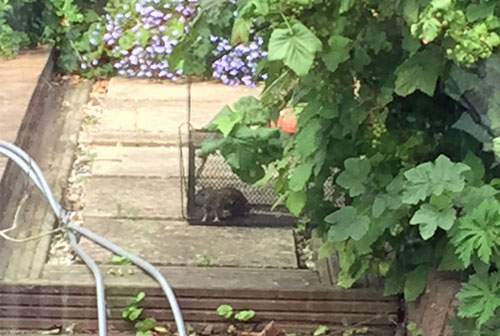Humane rat trap and release service in South Woodham Ferrers
 Have you noticed a rat in your garden in South Woodham Ferrers and would like to rehome it elsewhere?
Have you noticed a rat in your garden in South Woodham Ferrers and would like to rehome it elsewhere?
We have humane rat traps that you can borrow to catch the rat and release it in the countryside. These work very well; simply bait the rat trap with bread and something sweet like jam or peanut butter and you will catch the rat in no time.
This service is run purely for the benefit of rats and to raise funds for J's Hospice
All it costs is a £1 donation to J’s Hospice Charity to borrow the rat trap and a £6 deposit which is returned when you bring the trap back.
Rat trap hire and rat rehoming in the wild
If you are happy to bait the trap yourself and to repeat the process until the rat is caught but cannot bring yourself to physically remove it, we will come and take it away for you for an additional donation of £10 to J's Hospice.
The complete baiting, trapping and removing service.
If you cannot deal with catching and releasing the rat yourself, a full rat catching service is available for a £50 donation to J’s Hospice by cheque, in advance.
For this, John would pop round to your house and bait the traps. You would contact us as soon as you notice that the door to one of more traps has shut. Sometimes, smaller creatures such as mice or birds also get caught so it is important to release them as soon as possible and rebait the trap. This may entail multiple visits and resets of the traps.
Once the rat has been caught, it will be removed and released in a rural location away from homes and people.
You will receive a refund or the return of your cheque if the trap fails to catch a rat within 3 days.
Please send a text message to 07837422397 to request a call back
 Please note
Please note
Rats suffer distress when approached by us (the giants) and adult rats will scream. This humane service is intended to cause as little distress to the rats as possible.
Please keep people of any age away from the cage until the rat can be collected. If that is difficult, cover the cage with a dark cloth until collection.
How can you tell if a rat has moved into your garden?
Rats are attracted by free food. Most food waste is strictly regulated by having closed bins, however, some people still have compost heaps in their gardens and others feed birds.
The worst thing that you can do is to throw bread onto the ground or lawn where a rat has easy access. If you feed birds regularly in this way through the winter, a rat may just decide to make himself at home. Generous bird lovers may also give the birds cut up apple or other fruit and suddenly your garden becomes a rat haven. It is best to feed birds at a high level, although they do tend to throw food around as they peck.
One rat is a problem, two can be a disaster. It is best to dispatch a rat to somewhere where he can live and not be a pest sooner rather than later.
One of the tell-tale signs that you have a rat in your garden is when the birds stop coming down to get food. Winter is a tough time for all wild animals and rats will take bigger risks for a reliable source of food. They like to burrow under sheds or decking and may dig a series of entrance holes and exits. Most people tend to spot a rat, often at disk or early morning.
Is it legal to release wild rats in the countryside?
The view of the Department of the Environment (DEFRA) is that brown rats native to Britain can be released into the wild as long as it is not on private property. Concern is expressed about whether the new environment can sustain the rat or whether it will meet resistance from other rats or animals already present. Our view is that taking a risk gives the rat some chance compared to the alternative. Rats should be released far enough away from home not to find their way back. We have plenty of rough ground uninhabited areas within a short drive of South Woodham Ferrers.
Leaving rat poison in the garden is indiscriminate and may kill mice, hedgehogs and other small animals. The poison may end up in a food chain.
Rats may cause disease
Rats may carry diseases that harm or kill people. Weil’s disease or leptospirosis is spread through contaminated rat or cattle urine. People with ponds and rats in their gardens may be susceptible to this bacterial disease although there are usually less than 50 reported cases in England per year. People also catch it by swimming in rivers and lakes. Rats happily live with the condition. It is not something to become hysterical about because few people catch it but there are several other diseases that rats may carry, along with fleas, ticks and lice: salmonellosis, hantavirus pulmonary syndrome and others.
Other animals such as domestic cats and dogs often catch fleas and ticks.
Although to some people, rats are cute furry mammals similar to squirrels minus a bushy tail, it is not desirable or socially acceptable to allow rats to spread in gardens or near homes.
Purchase a Rat Trap
Rat traps are easily purchased in hardware stores and online should you wish to catch your own and keep a rat trap just in case.
